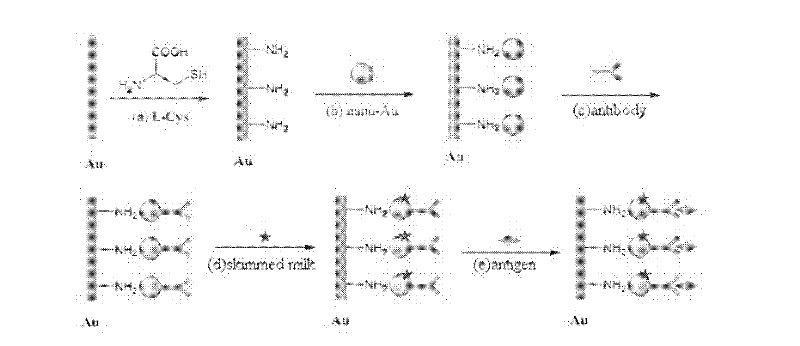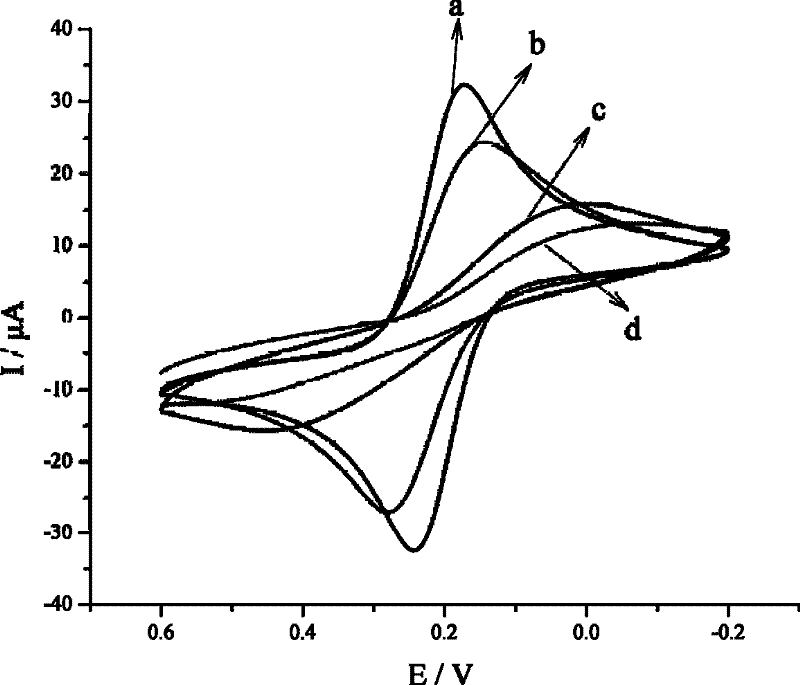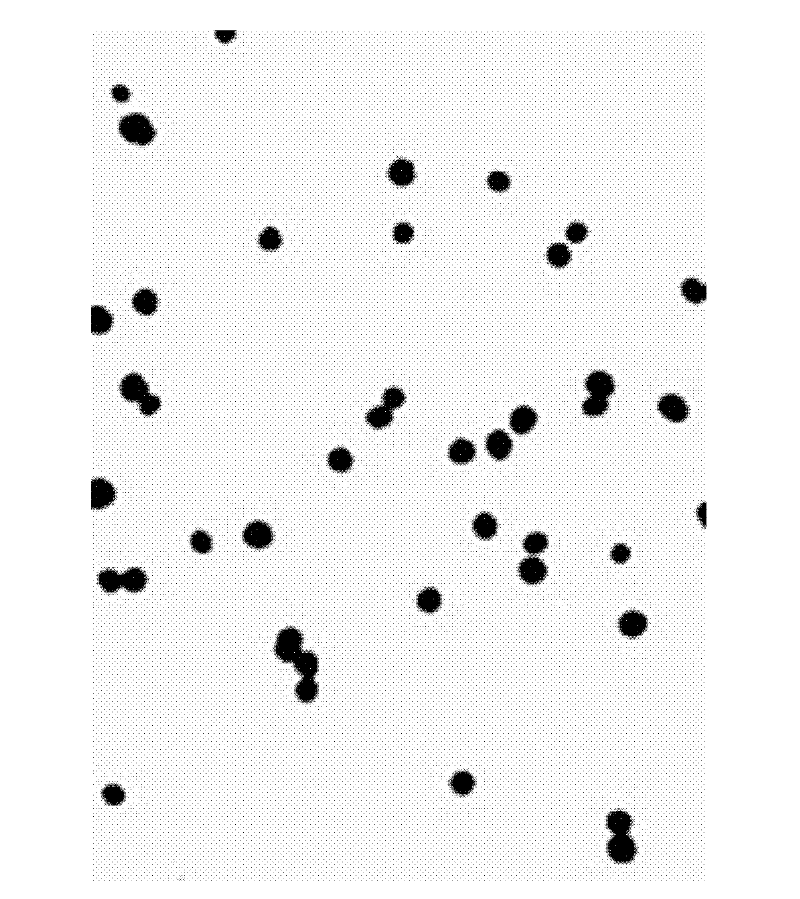Immunosensor for detecting aspergillus parasiticus used for producing aflatoxin and preparing method thereof
A technology of aflatoxin and parasitic Aspergillus, applied in the direction of instruments, measuring devices, scientific instruments, etc., can solve the problems of cumbersome detection steps, long detection time, low sensitivity, etc., and achieve the promotion of electron transfer, short response time, and specificity strong effect
- Summary
- Abstract
- Description
- Claims
- Application Information
AI Technical Summary
Problems solved by technology
Method used
Image
Examples
Embodiment 1
[0033] Step 1, the construction of the immunosensor: After polishing and cleaning the bare gold electrode, firstly immerse it in 0.3%-0.7% (m / v) L-cysteine, and soak it at 35-40°C for 3-7h. Then, stand overnight at 4°C to deposit gold nanoparticles, take it out, wash with ultrapure water, and blow dry. Apply 3-15 μL of homemade polyclonal antibody on the surface of the electrode, and incubate at 37°C for 1 hour. Finally, 10 μL of 5% skim milk-PBS solution was added dropwise as a masking reagent to block the non-specific adsorption sites, reacted at 37°C and washed with ultrapure water. Electrodes that are not used immediately need to be dried with nitrogen and stored in PBS with a pH of 7.4 at 4°C until use.
[0034] Step 2: Immunosensor detection of Aspergillus parasitica spore liquid: Aspergillus parasitica was cultured at 28° C. on a PDA slant solid medium for 5-7 days, and the spores were eluted with 10 mL of mold distilled water containing 0.05% Tween to prepare spores ...
Embodiment 2
[0036] Determination of spiked Aspergillus parasitica in actual samples of naturally fermented soybean paste
[0037] Step 1, the processing of naturally fermented soybean paste samples: the soybean paste sample is ground and sterilized, take 2g of soybean paste under aseptic operation, dilute it with 1:1000 sterile ultrapure water, and add the Aspergillus parasitica spore standard product, so that the final concentration is 150-1500cfu / mL. And configure a blank control of soybean paste without Aspergillus parasiticus spores.
[0038]Step 2, construction of the immunosensor: after polishing and cleaning the bare gold electrode, firstly immerse it in 0.5% (m / v) L-cysteine, and soak it at 37° C. for 5 hours. Then, stand overnight at 4°C to deposit gold nanoparticles, take it out, wash with ultrapure water, and blow dry. Apply 10 μL of homemade polyclonal antibody on the surface of the electrode, and incubate at 37°C for 1 hour. Finally, 10 μL of 5% skim milk-PBS solution was ...
Embodiment 3
[0043] Determination of Aspergillus parasitica in corn flour samples
[0044] Step 1, processing of corn flour samples: take 2 g of corn flour under aseptic operation, and grind them appropriately. Dilute with a certain concentration of sterilized ultrapure water after grinding.
[0045] Step 2, construction of the immunosensor: after polishing and cleaning the bare gold electrode, firstly immerse it in 0.5% (m / v) L-cysteine, and soak it at 37° C. for 5 hours. Then, stand overnight at 4°C to deposit gold nanoparticles, take it out, wash with ultrapure water, and blow dry. Apply 10 μL polyclonal antibody to aflatoxin-producing Aspergillus on the surface of the electrode, and incubate at 37°C for 1 hour. Finally, 10 μL of 5% skim milk-PBS solution was added dropwise as a masking reagent to block the non-specific adsorption sites, reacted at 37°C and washed with ultrapure water. Electrodes that are not used immediately need to be dried with nitrogen and stored in PBS with a pH...
PUM
| Property | Measurement | Unit |
|---|---|---|
| diameter | aaaaa | aaaaa |
Abstract
Description
Claims
Application Information
 Login to View More
Login to View More - R&D
- Intellectual Property
- Life Sciences
- Materials
- Tech Scout
- Unparalleled Data Quality
- Higher Quality Content
- 60% Fewer Hallucinations
Browse by: Latest US Patents, China's latest patents, Technical Efficacy Thesaurus, Application Domain, Technology Topic, Popular Technical Reports.
© 2025 PatSnap. All rights reserved.Legal|Privacy policy|Modern Slavery Act Transparency Statement|Sitemap|About US| Contact US: help@patsnap.com



